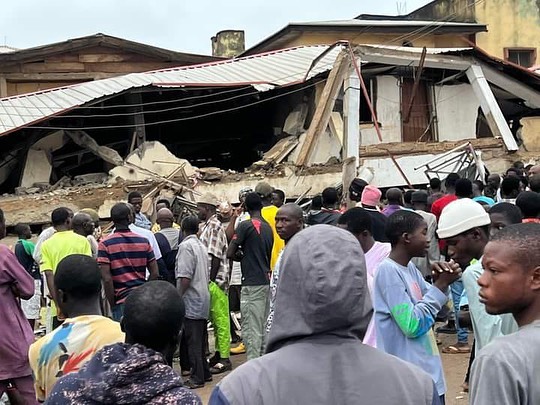The Council for the Regulation of Engineering in Nigeria (COREN) has reported a disturbing trend of structural failures, with 22 buildings collapsing across the country from January to July 2024.
The President of COREN, Prof. Sadiq Abubakar, revealed this during a press briefing on Wednesday in Abuja.
The news conference’s theme is “The Incessant State of Building Collapse in Nigeria in Recent Times: A Call for Sustainable Collaboration by All Stakeholders.”
According to Abubakar, there have been at least 22 reported cases of building collapse in Nigeria between January and July 14, with the highest incidence occurring in Lagos, accounting for 27.27% of the total.
Abuja and Anambra followed closely, each responsible for 18.18% of the cases, while Ekiti and Plateau accounted for 9.09% each.
Additionally, Kano, Taraba, and Niger states each accounted for 4.55% of the reported building collapses.
He said: “Records also showed that Lagos takes the lead in the incidence of building collapses.
“As a matter of fact, over 91 buildings have collapsed, resulting in the deaths of over 354 persons in Lagos from 2012 to date.
“Similarly, in Abuja, about 30 buildings have collapsed from 1993 until date, resulting in the deaths of more than 64 persons and injury of many.
“The most recent occurrences of building collapses close to DMGS Onitsha, Anambra State, on June 12 and that of a school (Saint Academy) in Plateau on July 13, where 22 students died and 134 were injured, as well as the building collapse in Kubwa, Abuja.
Abubakar expressed concern that the frequency of these incidents is alarming, necessitating a thorough examination and collective effort from all parties involved to address the issue and prevent future occurrences.
He said: ’’While we commiserate with all victims and families, we want to commend the efforts of all emergency and security services for their prompt response at the time.’’
Abubakar noted that the primary factors contributing to building collapse differ by location, but common causes include the ageing of structures, the use of inferior construction materials, and structural failures, as revealed by various investigations and research studies.
He said that other factors included the illegal change of use of buildings, the illegal addition of floors, quackery, and inadequate or lack of supervision and oversight.
Abubakar further stated that additional contributing factors include inadequate foundations, the absence of soil or geotechnical assessments, and unethical practices such as corruption and sharp practices.
He also praised the affected state governments for establishing inquiry panels to investigate the incidents, determine both immediate and underlying causes, and implement measures to prevent similar tragedies from occurring in the future.
Abubakar said: “This is not the time for apportioning blame or contest of superiority within the built environment, but a time for all stakeholders to unite and proffer a workable and lasting solution, particularly in the prevention of building collapses.
“All professionals within the built environment have a role to play in this.
“In this regard, we have identified and categorized many stakeholders that we will be engaging with shortly.”
The president warned that the increasing presence of illegal miners, even in residential areas, poses a significant threat to the structural integrity of buildings.
He urged affected states to take immediate action to address this issue and emphasized the need to enforce mandatory insurance for buildings under construction, stressing that the time for action is now.
Abubakar stated that, deeply concerned by the frequent and preventable building collapses in Nigeria, resulting in loss of life, COREN has decided to take decisive action to address this critical issue and prevent further tragedies.
He said that COREN had taken some steps to monitor and prevent building collapses by training and licensing Engineering Regulation Monitoring (ERM) inspectors.
According to Abubakar, COREN had reconstituted its Council Committee on Engineering Regulation Monitoring (ERM) and added an additional role of enforcement to its responsibility in accordance with the amended COREN Act.
He announced that COREN has established the ERM&E Task Force in various regions, including Ibadan, Port Harcourt, Enugu, Kano, FCT, Gombe, and Lagos, as part of a comprehensive strategy to combat building collapse and ensure structural integrity in the country.























Leave a comment